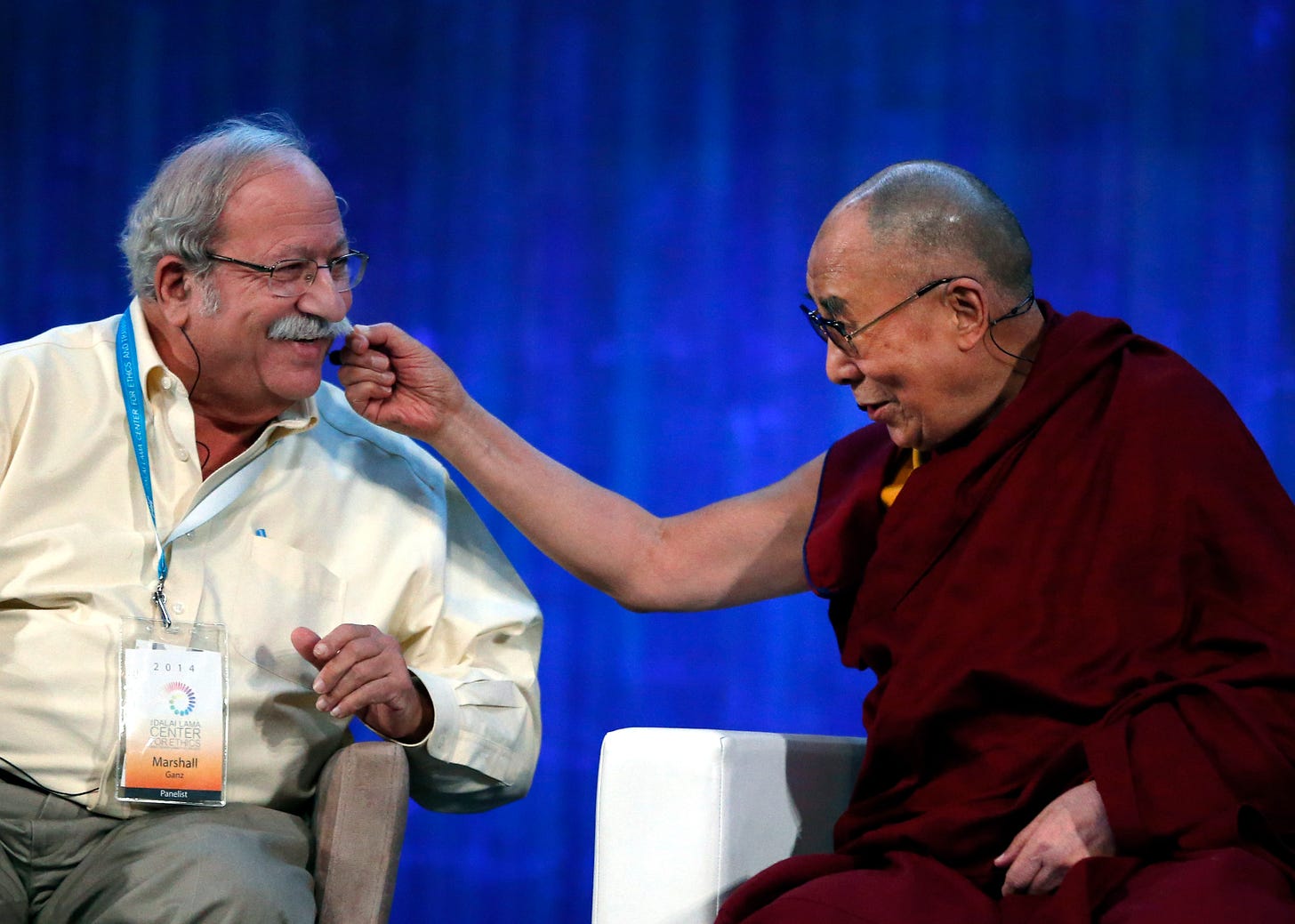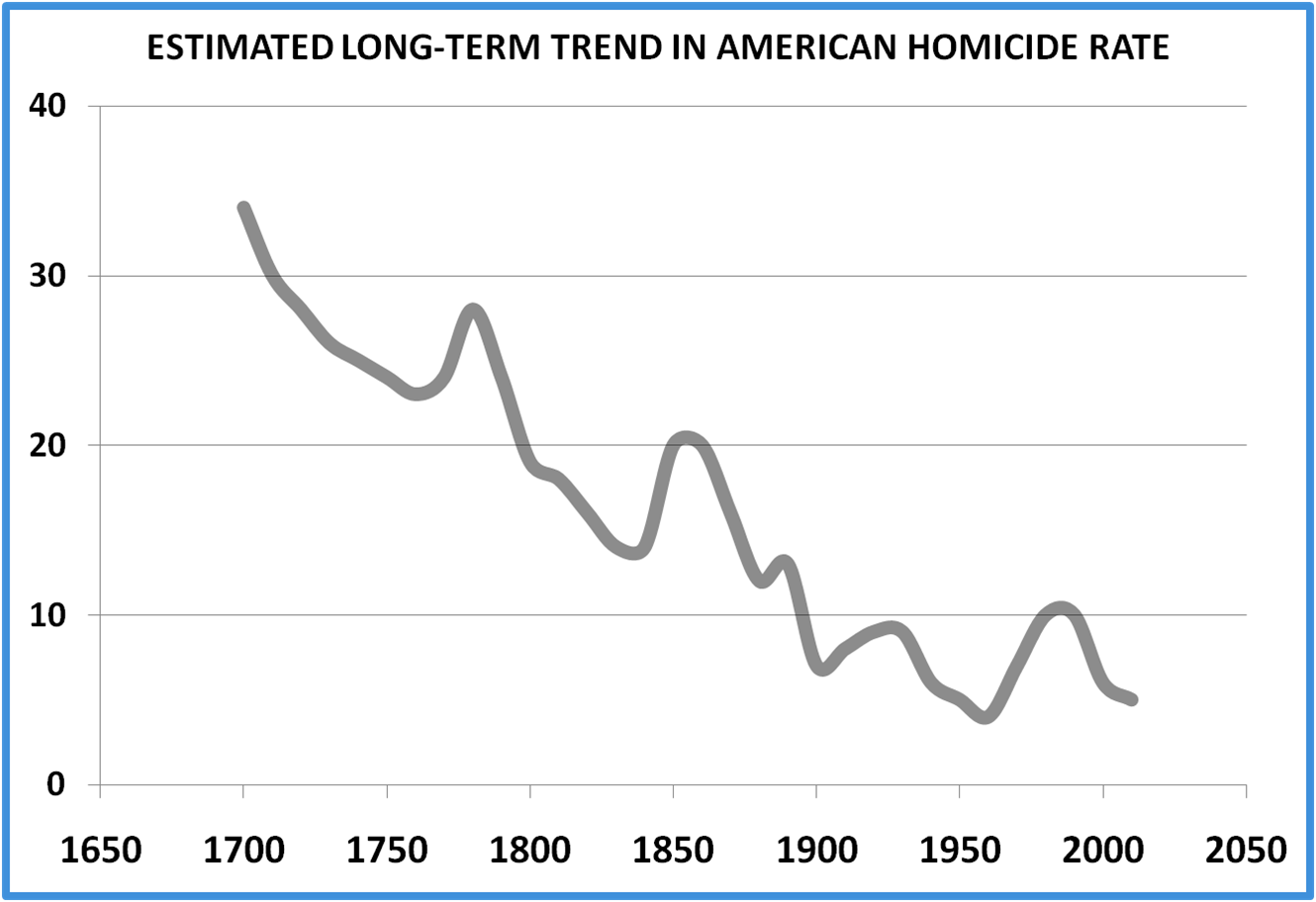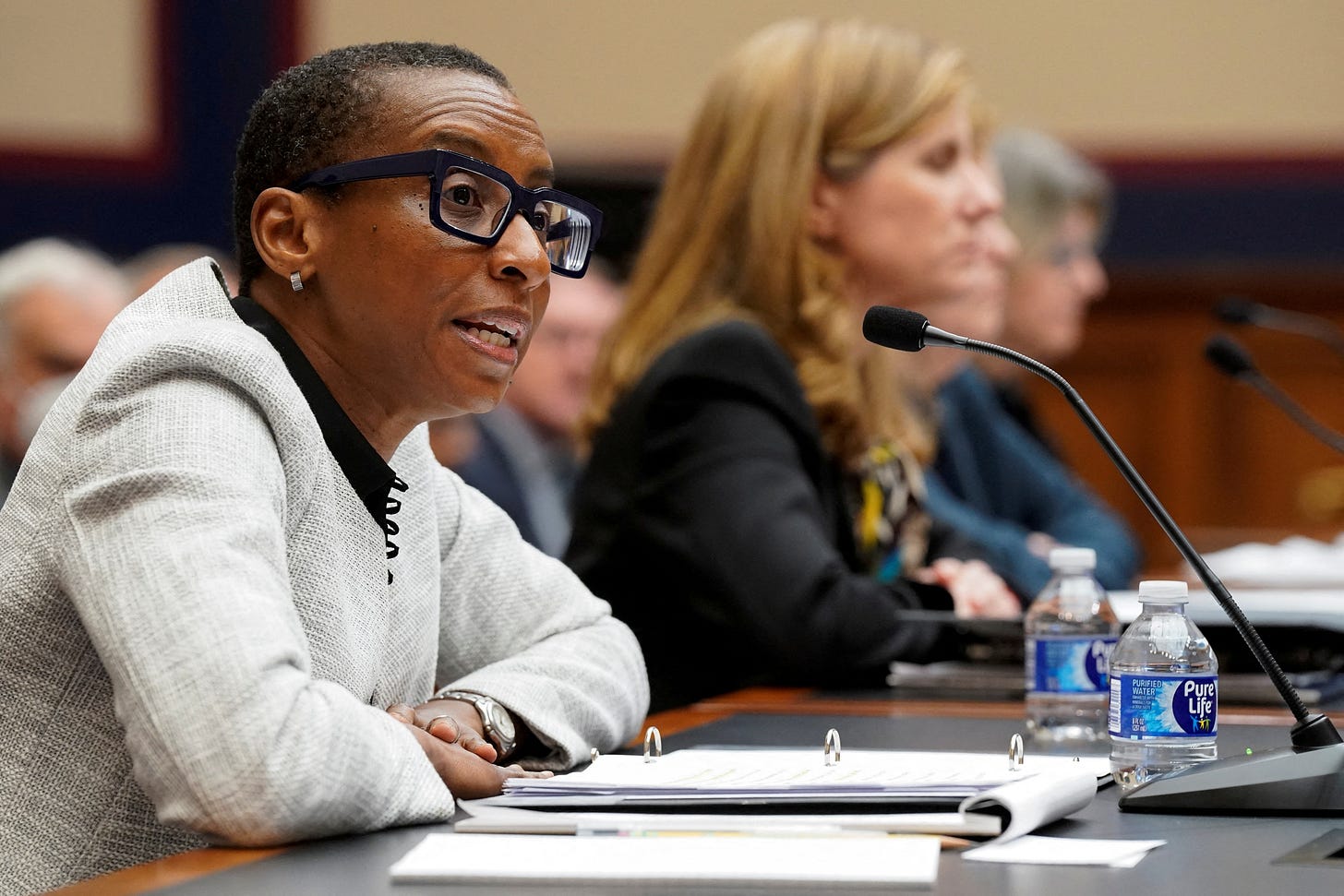What We Can All Learn From the Harvard Leadership Crisis
Leadership in the 21st century requires candor, curiosity, and courage.
On January 2, Dr. Claudine Gay resigned as president of Harvard University. Many commentators saw this as a victory in the fight against anti-semitism or plagiarism (or for right-wing trolls and their billionaire allies). But almost no one discussed one of the incident’s most important implications: the decline in leadership plaguing modern society. It’s not just Claudine Gay and other university presidents, but a wave of prominent leaders across many walks of life, who have been fired, pushed out, or just given up in recent years.
OpenAI co-founder Sam Altman, who ran the nation’s premier startup incubator YCombinator before launching ChatGPT last year, recently spoke about the disappearance of leaders in tech.
“What I want to know is, in the world today, where are the super great 25-year-old founders?” Altman asked. “There are a few, it's not fair to say there are none, but there are less than there were before.”
The decline in leadership extends to animal rights. One of the founders of open rescue in the United States, who performed groundbreaking work in the early 2000s, left the movement to work at a retail store. Another prominent senior leader at the Humane Society, with decades of experience leading successful campaigns, is now a wine taster in DC. A few years ago, shortly before I stepped down as lead organizer in 2019, it had become hard for me to count the number of key leaders we lost in DxE.
I can’t blame these leaders for leaving. Trust in organizations is hitting record lows. Meanness is hitting record highs. And leaders like Claudine Gay are in the crosshairs. Regardless of whether Dr. Gay deserved to be removed, most of us can probably agree that it would have sucked to be in her place. Faced with unprecedented challenges and pressures, leaders are an endangered species.
This is a problem for those of us who are trying to create change. As the legendary organizer Marshall Ganz has pointed out, the status quo needs no one to lead it, but those who seek change need leaders to push it forward. (Ironically, Ganz has faced serious leadership challenges himself.) So what can be done? A lot, it turns out. I’ve observed the Harvard situation closely and noted key moments where a crisis could have been averted. And there are three attributes that all of us need to cultivate in order to meet the leadership challenges of the 21st century: candor, curiosity, and courage.

Candor
Claudine Gay’s leadership crisis was triggered in part by a lack of candor. Watching her testimony at a hearing on December 5, it’s notable how practiced it feels. For example, when asked whether a call for “intifada” is a violation of Harvard’s harassment policy, Dr. Gay responded:
We embrace a commitment to free expression and give a wide berth to free expression even of views that are objectionable, outrageous, and offensive.
It was a legalistic answer that, while offending no one, felt fake and uninspired to everyone. An answer in which Claudine Gay didn’t say what she actually thought.
This lack of candor is toxic for modern leadership. With trust at all-time lows and disinformation at all-time highs, every leader needs to convey a sense of authenticity. In my 6-year tenure at DxE, we were hit with one crisis after the next where our leadership was seriously challenged. And the one thing that consistently worked, to win trust and unify the troops, was saying what I actually thought. For example, when the first wave of accusations of “retaliation” hit DxE in 2017, after I chose to remove someone from our legal team in an open rescue case, we called a meeting of everyone who was interested in attending – including the people accusing me of retaliation – and this is (roughly) what I said:
I can see why people are upset. But the reality is that I’m not just the leader of the project but a potential defendant. I have to be able to choose who I want to work with. And I feel like this person lied to me. Even if you disagree with me, I can’t work with someone in a legal case when that’s how I feel.
Some people weren’t happy. DxE had always been inclusive to a fault, and averse to demonstrations of “authority,” especially when it meant kicking someone out of a role. Many people also felt that the removed person’s “lie” – falsely stating that she had done work that hadn’t been done – was insignificant. But even when people disagreed with me, the vast majority trusted that I was being candid with them. Ultimately, 90+% of the chapter approved the decision.
Candor, even when it was hard, was the right choice.
Instead of taking this route, Claudine Gay chose non-answers in the face of alleged atrocities. But before you condemn Dr. Gay, remember this: Candor is not just up to the leaders but to all of us. Leaders can’t be candid unless the community is ok with them saying candid things that will make some people uncomfortable. Back in 2017, when I made the decision to remove someone from a legal position, the vast majority of people in our community did not punish me for my candor. In the long run, that’s good for us all because when people see a leader supported, despite expressing an uncomfortable point of view, they realize they can express uncomfortable thoughts, too. And to meet the challenges of the 21st century, we need a lot of people who will say what they actually think.
So here’s a simple test: in the face of social pressure, do you say what you actually think, and support others in doing the same?
Curiosity
But how do we know that “uncomfortable” candor is just uncomfortable and not politically catastrophic? Even if internal stakeholders accept a leader who’s candid, external parties may pounce on an “uncomfortable opinion” expressed by a leader and try to destroy an entire organization. This is, in fact, why so many leaders, like Claudine Gay, choose the path of performance over candor. It’s easy to offer safe, practiced answers when our candid opinion might subject us to hate or our organizations to reputational ruin.
This brings us to the second key lesson on leadership: curiosity. You cannot effectively practice candor, as a leader, if you don’t also practice curiosity.
This is demonstrated by the crisis at Harvard. Throughout Dr. Gay’s testimony, it’s clear she has zero interest in questions from her adversaries. You see her roll her eyes, purse her lips, and quietly sigh as if she’s talking to a child having a tantrum. And you can understand why. Rep. Elise Stefanik and other questioners are being jerks – interrupting and screaming at her before she can answer. Watch the hearing starting at 1:07:22:
And yet, leaders must be curious, especially with their critics. At DxE, we had a leader of our tech team many years ago who was a clumsy speaker, inexperienced as an activist, and not particularly charismatic. And yet with him at the helm, the tech team grew to include a dozen-plus members and accomplished tremendous things, including developing a smartphone app for the Animal Liberation Conference and a world-class activist database. He did this primarily through the power of curiosity.
He always showed genuine interest in other people. Their projects. Their ideas. Their lives. The result was that when there were conflicts – for example, about the right approach to a certain coding problem – people mostly trusted him because he showed curiosity in their dissenting point of view.
Now imagine if, in response to Rep. Stefanik’s attacks, Dr. Gay had made a genuine effort to understand the Congressmember’s point of view.
I hear you, in saying you want me fired, and I want to understand that. What would you do if a student told you that when they say intifada, they mean non-violent struggle – nothing more? I’ll be candid with you: I don’t think that student should be punished. But what’s your take?
If Dr. Gay had responded this way, she and Harvard would have survived the leadership crisis. Curiosity is disarming, and gives space for someone to say what they think. Perhaps most importantly, when we ask questions, and don’t just offer opinions, we learn something from even our most abrasive critics. Dr. Gay, for example, might have understood more about why many Jewish people consider the term intifada a call for genocide. But she wasn’t curious. So she never learned.
But once again, it’s not just on leaders. We all need to show that curiosity – not only to protect a culture of candor but to get people of widely diverging backgrounds and opinions to work together even in the face of conflict.
So here’s another test: when you’re in a disagreement, do you show genuine curiosity in the other position? Are you making quick judgments - or asking questions and seeking to understand?
Courage
But by far the most important attribute of modern leadership is courage.
The Harvard controversy is a lesson in what happens when everyone is afraid. The crisis began with a letter from various student groups condemning Israel, but not Hamas, for the violence on October 7, 2023. The backlash was intense, as critics, including former Harvard President Lawrence Summers, condemned the students for their “morally unconscionable” statement. A truck with a large electronic display began driving around the campus with students’ names, faces, and the headline: “Harvard’s Leading Anti-Semites.”
In the face of this backlash, the Palestinian activists were terrified. There was a stampede by the very students who signed the letter to flee from its consequences. “I have not been on the Harvard campus this semester and was not involved,” one leader of a Palestinian support organization said. Even the few people who stood by the letter insisted on anonymity. “We are scared to be Palestinian at this university,” one nameless activist at a campus vigil said.
Fear was also driving the other side. One Israeli student described Harvard’s initial silence, in response to the pro-Palestinian letter, as “terrifying.” Metal detectors were set up on the Harvard campus for a Shabbat dinner, despite the lack of any apparent threat. And a group of students sued the university for creating an “unsafe” environment for Jews by, for example, taking funding from “sources that support Hamas or have links to terrorist organizations, like Qatar, Lebanon, and the Palestinian Authority.”
Most crucially, fear was driving the Harvard leadership’s response. Even as Dr. Gay resigned from her position, she led with fear. Literally. Fear is the main theme of the lead paragraph of her New York Times op-ed:
On Tuesday, I made the wrenching but necessary decision to resign as Harvard’s president. For weeks, both I and the institution to which I’ve devoted my professional life have been under attack. My character and intelligence have been impugned. My commitment to fighting antisemitism has been questioned. My inbox has been flooded with invective, including death threats. I’ve been called the N-word more times than I care to count.
The attacks on Dr. Gay are deplorable, and you can understand why she focused on these facts. No one should be subjected to death threats or racial epithets. But the problem is this: One of the most important functions of leadership is to inspire courage in the face of fear. And you can’t do that if you don’t model the behavior yourself.
Fear is a powerful evolutionary force that drives people to conflict. It’s hard to work together with someone, or even tolerate their presence, when you’re afraid they might stab you in the back. But our fear is often misplaced in the modern world, where disagreements, even of the most intense varieties, rarely lead to stabbings or other violence. Consider the long-term trend of lethal violence in the United States.

What’s true of the US homicide rate is true of violence across the world. For example, a single conflict in 8th century China, the An Lushan rebellion, may have killed 17% of the entire global population. Even the worst conflicts of the 20th century, such as World War II, are paltry (2.2% dead) by comparison. Given the violent history of our species, the world has become a shockingly peaceful place.
But our brains have not caught up with this change. And one of the astonishing things about the conflict at Harvard is that real violence – 7,000 miles away in Gaza and Israel – triggered terror in one of the safest and most privileged places on planet Earth: an elite American university.
Leadership’s role is to challenge that fear and call on communities to be brave. To sometimes go toward people and ideas that are uncomfortable and outrageous and even dangerous, rather than running away. When leaders do that, something magical happens: Everyone becomes less afraid.
In one of my last conversations with my best friend Priya Sawhney (before the court’s recent order that tore her and 13 others from my life), I told her she had one leadership attribute above all others: She is phenomenally brave. Whenever we needed someone to get in front of a hostile crowd, strong enough to bear hatred and attacks, she’d be the first to volunteer. If there was an uncomfortable public statement that needed to be made, she’d ask to place it in her name. It’s one of the many reasons that losing her is so devastating. Courage like that is rare and beautiful and contagious. Over the years, people who saw her example were also inspired to be brave.
“You are the dragon,” I told her.
And when you are with a dragon, it’s easy to be brave.
If only Claudine Gay understood that her job wasn’t to cater to the fears of groups at Harvard, but to be the dragon. Imagine that, instead of hiding behind legal technicalities, she went to the Jewish community of Harvard and challenged them to consider a different point of view.
I feel your pain. I read the Times’ piece about the horrifying violence against Israeli women, inflicted by Hamas, and it brought tears to my eyes. But what can I say to the Palestinian on campus whose sister found her dead child buried under the rubble of Gaza? How do we make space for her pain, too?
And imagine that she went to the Palestinian organizations and said:
Children are being killed in Gaza. Children! How can we not be angry and afraid? But this is the hard thing: there are children on the other side who are still hostages in Gaza. Imagine what that’s like: to know that, any moment, your child could be killed, just because of who she is! How can we stand for her life, too? That’s what the Jewish groups on campus want from us all.
Of course, some on both sides would be infuriated by these statements. There are always people who see things as black and white. But the vast majority of Harvard students – and other human beings, too – are better than that. And it’s the job of leadership to find these better angels in all of us. To say the hard things no one else will say. To do the dangerous things no one else will do. And to inspire others with our courage.
So ask yourself: when the world seems scary, have I been willing to jump into the very things that make me afraid? Am I willing to be brave?
It’s not just leadership at Harvard, but the fate of our species, that may rest on our answer to that question. But I believe that, when people reflect on who they want to be, they will see they don’t want to be fake, apathetic, and afraid. They want to be leaders. And it’s only when each of us finds the leadership potential within ourselves – when you find the candor, curiosity, and courage within yourself – that the decline in leadership will be reversed, and the world’s greatest problems finally solved.
—
There have been some tremendous pieces published on animal rights in the last week. Reuters columnist Jenna Greene published an insightful piece on the growth in the right to rescue. My former co-defendant Andrew Sharo, a conservation geneticist, wrote an article describing why he’s proud of his felony charges in the most important scientific publication in the world, Science Magazine. And Zoe Rosenberg, the brave activist recently charged for rescuing hens in Sonoma County, wrote an article on being forced to wear an ankle monitor that has been trending on the Daily Kos.
We are looking for feedback on messaging framings in the upcoming Ridglan Trial. If you have one minute — literally just one minute — fill out this survey!
The Simple Heart is still looking for help with two positions in San Francisco: Chief of Staff (paid) and podcast manager (volunteer). The former role, chief of staff, is a jack-of-all trades role that will help us ensure all operations at The Simple Heart are managed well as I dive back into trial. The application is here. The latter role, podcast manager, is a volunteer role that probably requires around 5 hours a week and some technical expertise. We need someone to help us set up the equipment, upload files for our editor, and manage the process of getting the podcasts posted. Send an email to info@simpleheart.org if you’re interested!





Wow! As always, you blow me away with your brilliance, insightfulness, and candor. Talk about brave, you epitomize it. I am heartbroken for you to have lost your best friends, but time truly does fly, and soon you guys will be in constant contact again, fighting the good fight. Please please don't ever give up. I only wish we could send you to Israel and Gaza, I have no doubt that you alone could make everyone see reason and restore peace to the Middle East, something so desperately needed now, just as the right to rescue is as well. Thank you so very much for all you do. You are so appreciated and cherished.
Wayne, as always, I learn from your Substacks. I didn't realize so many high profile Animal Rights Activists had given up and gone into positions in the private sector. That fills me with disparare. I have been doing work as an online activist to support rescue groups since I was placed on disability in 2008. Since then, I have been able to connect online with hundreds of rescues worldwide and help spread their messages. It saddens me to know that Leadership, especially, fine Leadership like yours, is waning in the field of rescue work, education and humanitarian roles. Such roles are so vital to our society and our survival as a civilized species. I truly hope that this trend will somehow turn around. There is, I believe, overall, more meanness in our society since our country has become so politically divided. As that has happened, I have observed less tolerance for any objection to the corporate or system rule of law. The courts seem rigged against us.